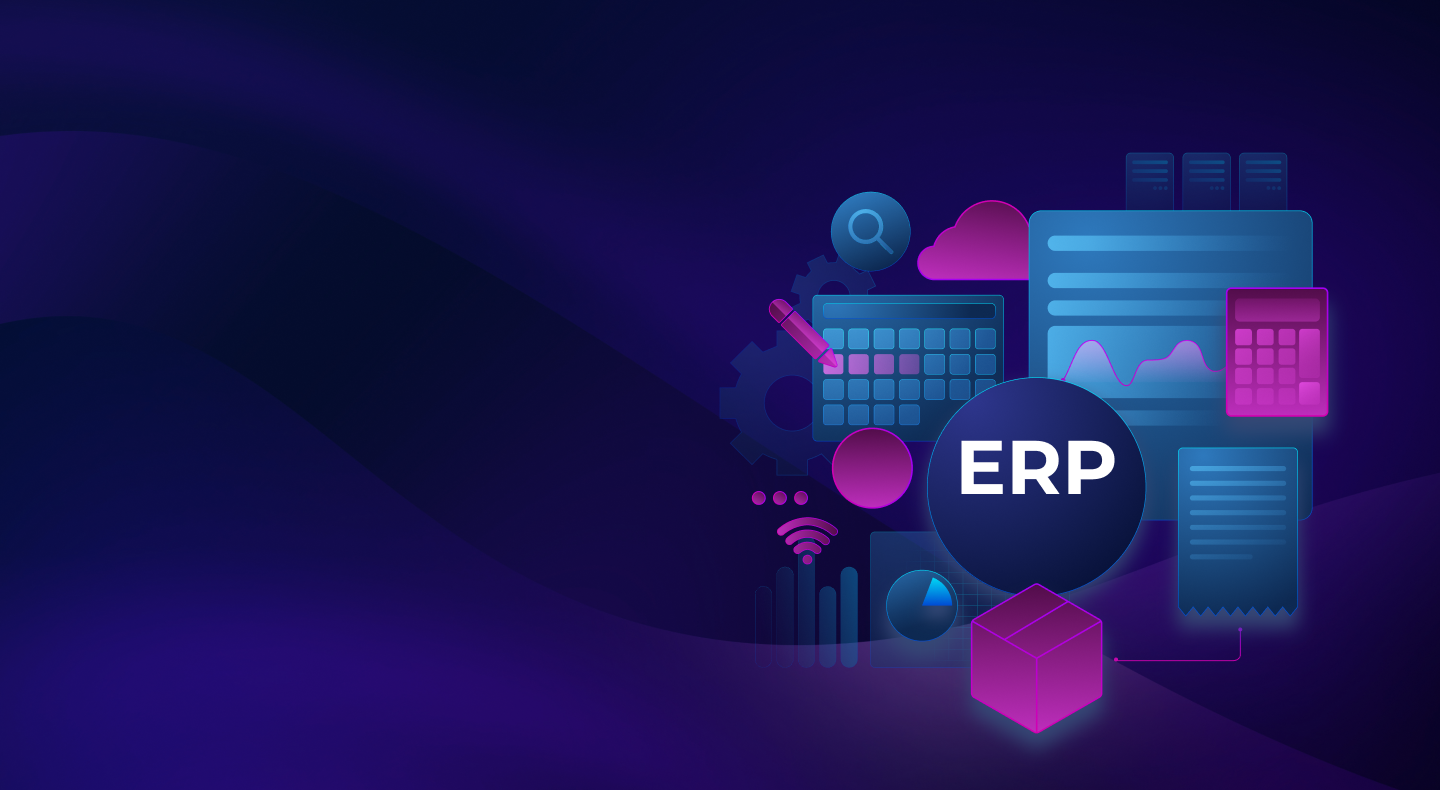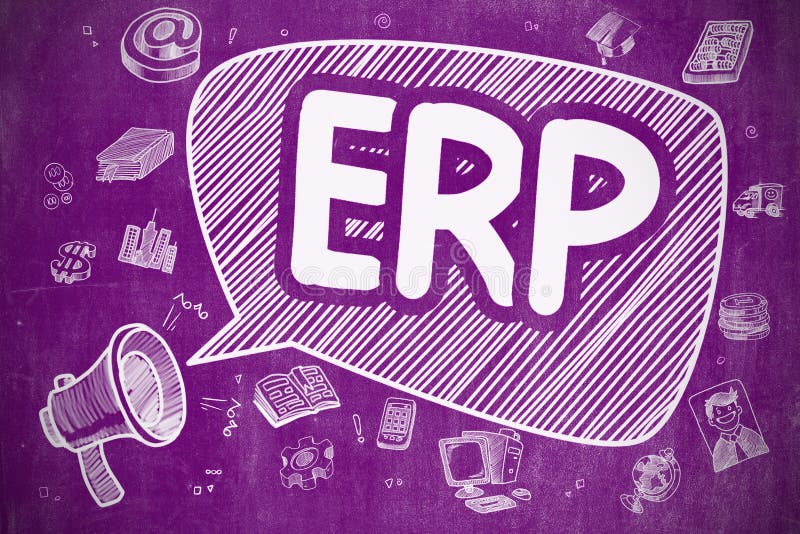An enterprise resource planning (ERP) system is an integrated software system that aims to unify and link the core processes of an organization within a single platform. This integration helps improve operational efficiency, reduce costs, and provide accurate insights to decision makers. An ERP system typically consists of several basic components or modules, each serving a specific aspect of the business. In this article, we provide a detailed explanation of the 7 most important basic components of an ERP system.

The basic concept of an ERP system
It is a program or group of programs that unify and connect the basic processes within an organization, through the ERP program
Daily activities are carried out and monitored in real time via a central database.
Components of an enterprise resource planning (ERP) system
An enterprise resource planning (ERP) system typically consists of several components or modules, which can be activated according to the organization's needs. The 8 most important of these are:
1. Human Resource Management (HRM)
The Human Resources Management module in the Enterprise Resource Planning (ERP) system is one of the most important modules that enables organizations to manage their human capital efficiently and effectively. This module includes an integrated set of tools that help organize and update employee data, manage recruitment processes, evaluation, and training, in addition to tracking attendance and departure, and preparing payroll statements accurately and in accordance with approved policies.
The Human Resources module in the Enterprise Resource Planning (ERP) system also enables the automation of many administrative processes, reducing manual errors and saving time and effort. The Human Resources module in the best ERP software also contributes to improving the decision-making process through accurate reports and analyses related to job performance, training needs, and productivity level. In short, this module helps achieve a balance between the organization's goals and employee needs Which supports sustainable growth and operational efficiency.
2. Accounting and Finance
This unit is the financial backbone of an enterprise resource planning (ERP) system, and even represents the financial heart of an organization. This unit enables accurate tracking of financial transactions, management of general accounts, accounts receivable and payable, and fixed assets, as well as automated and integrated preparation of financial reports and budgets. By linking with other units such as purchasing, inventory, and sales, the accounting and finance unit ensures the availability of real-time and comprehensive data that helps management make informed strategic decisions and achieve efficient compliance with accounting and tax standards.
3. Supply Chain Management (SCM)
The supply chain management module in an enterprise resource planning (ERP) system is one of the most important modules used to manage and improve processes related to the flow of goods and services, from suppliers to products reaching end customers. This module integrates all key activities in the supply chain into the best unified ERP system to ensure efficiency and transparency.
Main components of an SCM module in an ERP system:
- Order Management: Helps track orders from creation to delivery, including confirmation, shipping, and invoicing.
- Inventory Management: Provides a comprehensive view of inventory in real time, helps improve storage levels and reduce costs.
- Procurement Management: Includes purchases from suppliers, from purchase orders to receipt and inspection of goods.
- Logistics and Transportation Planning: Manages shipping and distribution operations, helps choose the optimal mode of transportation and reduces distribution costs.
- Production Planning: Supports production scheduling based on orders, material availability, and resource capabilities.
- Supplier Relationship Management: Helps evaluate supplier performance and communicate effectively with them to ensure materials are available in the required quality and time.
- Demand Forecasting: Analytical tools are used to forecast future demand for products based on historical data and market trends.
4. Production and manufacturing management
The Production and Manufacturing Management module in the Enterprise Resource Planning (ERP) system is an essential part that aims to organize and monitor all processes related to the production process within the organization. This module includes planning and manufacturing products, managing production schedules, monitoring resources and raw materials, and tracking manufacturing progress in real time. This module also contributes to the ERP accounting program in improving process efficiency and reducing costs by scheduling work optimally and ensuring product quality Coordination between various departments such as inventory, purchasing, and quality.
5. Sales Management
The sales management module in an enterprise resource planning (ERP) system is an essential part that aims to organize and coordinate all sales-related processes within the organization. This module, through ERP corporate management software, tracks orders from the moment they are received until the product or service is delivered to the customer, which facilitates inventory management, setting prices, preparing invoices, and recording payments.
The sales management module in the Enterprise Resource Planning (ERP) system also enables accurate analysis of sales data to improve marketing strategies and increase the efficiency of business processes, which contributes to enhancing customer satisfaction and increasing profits. Thus, the sales management module is a vital tool for integrating all sales steps into a unified system that supports quick and effective decision-making.
6. Customer Relationship Management (CRM)
Customer Relationship Management (CRM) is an important unit within the Enterprise Resource Planning (ERP) system, as it enables companies to track customer interactions, plan marketing campaigns, and improve customer service, and also provides analyzes that help understand customer behavior and anticipate their needs, which enhances loyalty and satisfaction.
CRM module function within ERP system:
- Record customer data (contact information, interaction history, purchase, technical support...).
- Manage and follow up on sales opportunities from the beginning until the deal is completed.
- Automate marketing processes such as mail campaigns, and track customer responses.
- Support customer service by tracking orders, complaints, and technical support.
- Analyze customer behavior and provide reports that help make better business decisions.
7. Project Management
The Project Management Module in the Enterprise Resource Planning (ERP) system is a vital module that helps companies and organizations organize and monitor all project phases, from planning to implementation and delivery. This module provides integrated tools for planning financial, human, and logistical resources, setting work schedules, monitoring costs, and controlling quality, in addition to accurately monitoring work progress and analyzing performance.
Through integration with the rest of the ERP accounting system modules, such as accounting, purchasing, and warehouses, the project management module provides a comprehensive and synchronized view that helps in making sound and quick decisions that ensure the success of the project and achieve the desired goals with high efficiency.
Conclusion:
The presence of these 7 components in an enterprise resource planning (ERP) system provides organizations with a comprehensive platform to manage their operations efficiently and effectively, and integration between these units achieves a comprehensive vision and helps in making accurate and quick decisions, which enhances the organization's competitiveness in an ever-changing work environment.
other topics:
reference:
1. <<5 Essential Benefits of Choosing an Efficient ERP System>>, readwrite
2. <<Reasons to Use ERP Systems in Businesses>>, enterprisetalk

Add New Comment